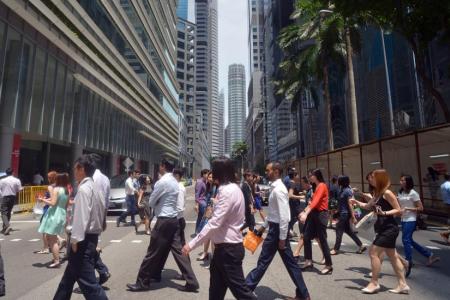People here less hopeful about opportunities: Poll
Difficult job market, age, lack of financial resources among barriers to success
People in Singapore are less optimistic than average about opportunities available to them, according to a new report.
Respondents said a difficult job market, age and a lack of financial resources were the top barriers to success, amid an uncertain economic outlook.
The poll was commissioned by professional network LinkedIn. The index ranked 22 markets based on seven factors, including quality of life in terms of happiness, outlook on the economy over the next 12 months and confidence in achieving success.
Singapore was in the bottom half for six of the factors.
It did poorly in terms of levels of happiness and confidence in achieving success, coming in 18th for both categories.
But it was ranked eighth for having a better quality of life compared with previous generations.
A similar survey in 2018 placed Singapore at sixth out of nine Asia-Pacific economies examined. The study was expanded this time and covered more than 30,000 respondents aged 18 to 65, including about 1,000 from Singapore, between September and October last year.
Most of those polled here were working.
A key finding discussed the main barriers that people felt were hindering their success.
It found 25 per cent of respondents here cited a difficult job market as the main gap, while 22 per cent pointed to age and 20 per cent to financial status.
Older workers were more likely to feel held back by their age, with 52 per cent of baby boomers (born between 1946 and 1964) and 31 per cent of Generation X respondents (born 1965 to 1980) naming it as the top opportunity gap.
A difficult job market had also emerged as the top opportunity gap in the 2018 report, followed by insufficient financial resources and a lack of networks.
NEW OPTION
Age was a new option added this year, after feedback from respondents in the last survey.
Separate results released on Monday by recruitment company Randstad showed that 41 per cent of people surveyed here blamed their age for the unfair way they were managed compared with their colleagues.
Dr Helen Ko, a senior lecturer in gerontology at the Singapore University of Social Sciences, noted: "Ageism is still quite prevalent in Singapore and probably in many other countries as well."
She suggested, among other things, that businesses help to change mindsets about older workers by sharing research which has found that age-related declines in health do not generally adversely affect performance or productivity.
Get The New Paper on your phone with the free TNP app. Download from the Apple App Store or Google Play Store now



